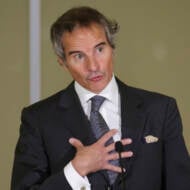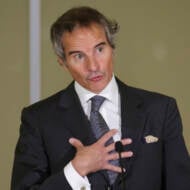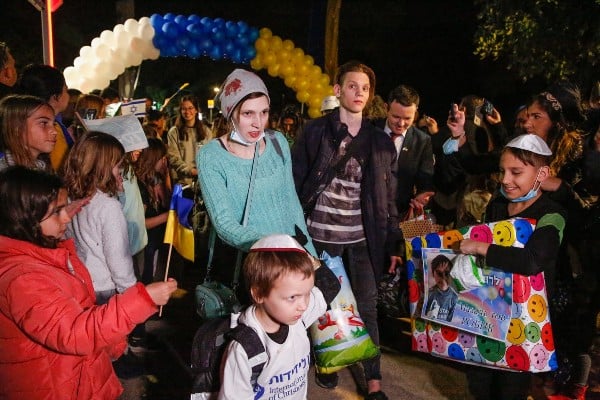
UN Minimizes Iran’s Near Weapons-Grade Nuclear Material

While Iran has vowed to destroy the world’s only Jewish state, the UN continues to minimize the Islamic Republic’s nuclear threat.
By Associated Press and United with Israel Staff
The head of the U.N.’s nuclear agency said Saturday that Iran pledged to restore cameras and other monitoring equipment at its nuclear sites and to allow more inspections at a facility where particles of uranium enriched to near weapons-grade were recently detected.
But a joint statement issued by the International Atomic Energy Agency and Iran’s nuclear body only gave vague assurances that Tehran would address longstanding complaints about the access it gives the watchdog’s inspectors to its disputed nuclear program.
IAEA Director General Rafael Mariano Grossi met with Iranian President Ebrahim Raisi and other top officials in Tehran earlier Saturday.
“Over the past few months, there was a reduction in some of the monitoring activities” related to cameras and other equipment “which were not operating,” Grossi told reporters upon his return to Vienna. “We have agreed that those will be operating again.”
He did not provide details about which equipment would be restored or how soon it would happen, but appeared to be referring to Iran’s removal of surveillance cameras from its nuclear sites in June 2022, during an earlier standoff with the IAEA.
His first visit to Iran in a year came days after the IAEA reported that uranium particles enriched up to 83.7% — just short of weapons-grade — were found in Iran’s underground Fordo nuclear site.
The confidential quarterly report by the nuclear watchdog, which was distributed to member nations Tuesday, came as tensions were already high amid months of anti-government protests in Iran and Western anger at its export of attack drones to Russian forces fighting in Ukraine.
The IAEA report said inspectors in January found that two cascades of IR-6 centrifuges at Fordo were configured in a way “substantially different” to what Iran had previously declared. That raised concerns that Iran was speeding up its enrichment.
Grossi said the Iranians had agreed to boost inspections at the facility by 50%. He also confirmed the agency’s findings that there has not been any “production or accumulation” of uranium at the higher enrichment level, “which is a very high level.”
Iran has sought to portray any highly enriched uranium particles as a minor byproduct of enriching uranium to 60% purity, which it has been doing openly for some time.
The chief of Iran’s nuclear program, Mohammad Eslami, acknowledged the findings of the IAEA report at a news conference with Grossi in Tehran but said their “ambiguity” had been resolved.
Nonproliferation experts say Tehran has no civilian use for uranium enriched to even 60%. A stockpile of material enriched to 90%, the level needed for weapons, could quickly be used to produce an atomic bomb, if Iran chooses.
Iran has vowed to destroy the world’s only Jewish state and frequently issues threats to Israel. It also bankrolls and trains a network of terror armies across the region, including Palestinian Islamic Jihad in Gaza, Hezbollah in Lebanon, and the Houthis in Yemen. These forces destabilize the region and engage in proxy wars with Israel and Saudi Arabia.
Iran’s 2015 nuclear deal with world powers limited Tehran’s uranium stockpile and capped enrichment at 3.67% — enough to fuel a nuclear power plant. It also barred nuclear enrichment at Fordo, which was built deep inside a mountain in order to withstand aerial attacks.
The U.S. withdrew from the accord in 2018, reimposing crushing sanctions on Iran, which then began openly breaching the deal’s restrictions. Efforts by the Biden administration, European countries and Iran to negotiate a return to the deal reached an impasse last summer.
The joint statement issued Saturday said Iran “expressed its readiness to continue its cooperation and provide further information and access to address the outstanding safeguards issues.”
That was a reference to a separate set of issues from the highly enriched particles.
Over the past four years, the IAEA has accused Iran of stonewalling its investigation into traces of processed uranium found at three undeclared sites in the country. The agency’s 35-member board of governors censured Iran twice last year for failing to fully cooperate.
The board could do so again when it meets on Monday, depending in part on how Western officials perceive the results of Grossi’s visit.
Western officials have suggested the so-called safeguards probe of the three sites could confirm longstanding suspicions that Iran had a nuclear weapons program up until 2003. Iran has long denied ever seeking nuclear weapons and continues to insist that its nuclear program is entirely for peaceful purposes.
The dispute over the safeguards probe was the main obstacle in negotiations last year to restore the nuclear agreement.
Bring Purim Joy to Israeli Victims of Terror!
Join us in providing Israeli victims of terror and Jewish refugees from Ukraine – who have suffered terribly – with much needed comfort, blessing and holiday joy.
Families have been destroyed by ongoing terror attacks. Orphans have been rescued to Israel from brutal bombings in Ukraine. They need our compassion and love!
Brighten their holiday by sending beautiful Purim food baskets, yummy treats, personal notes and amazing toys for the children.
CLICK HERE TO SEND YOUR PURIM GIFT & PERSONAL NOTE TO THE VICTIMS
The post UN Minimizes Iran’s Near Weapons-Grade Nuclear Material first appeared on United with Israel.
United with Israel
